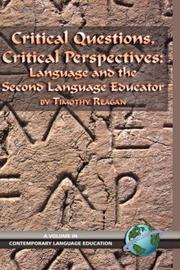| Listing 1 - 10 of 20 | << page >> |
Sort by
|
Digital
ISBN: 9783030109677 Year: 2019 Publisher: Cham Springer International Publishing :Imprint: Palgrave Macmillan
Abstract | Keywords | Export | Availability | Bookmark
 Loading...
Loading...Choose an application
- Reference Manager
- EndNote
- RefWorks (Direct export to RefWorks)
‘This book provides the first comprehensive study of language legitimacy and social justice. It tackles the very real problem of language prejudice and offers solutions to dealing with this problem. Dr. Reagan has spent his entire career debunking misconceptions about the “value” of one language or one dialect over another and consolidates his findings here with reference to a substantial body of previous research covering a wide variety of languages.’ —Frank Nuessel, University of Louisville, USA This book examines the nature of human language and the ideology of linguistic legitimacy – the common set of beliefs about language differences that leads to the rejection of some language varieties and the valorization of others. It investigates a broad range of case studies of languages and dialects which have for various reasons been considered 'low-status' including: African American English, Spanglish, American Sign Language, Yiddish, Esperanto and other constructed languages, indigenous languages in post-colonial neo-European societies, and Afrikaans and related language issues in South Africa. Further, it discusses the implications of the ideology of linguistic legitimacy for the teaching and learning of foreign languages in the US. Written in a clear and accessible style, this book provides a readable and pedagogically useful tool to help readers comprehend the nature of human language, and the ways in which attitudes about human language can have either positive or negative consequences for communities and their languages. It will be of particular interest to language teachers and teacher educators, as well as students and scholars of applied linguistics, intercultural communication, minority languages and language extinction. Timothy Reagan is the Dean of the College of Education and Human Development and Professor of Linguistics at The University of Maine, USA. .
Sociology of minorities --- Sociology --- Human rights --- Teaching --- Mass communications --- Sociolinguistics --- Sign language --- Linguistics --- Language and literature --- mensenrechten --- minderheden --- sociologie --- linguïstiek --- gebarentaal --- interculturele communicatie --- antropologie --- onderwijsonderzoek

ISBN: 0805848576 Year: 2005 Publisher: Mahwah Erlbaum
Abstract | Keywords | Export | Availability | Bookmark
 Loading...
Loading...Choose an application
- Reference Manager
- EndNote
- RefWorks (Direct export to RefWorks)
Comparative education --- Educational anthropology --- Education --- Philosophy

ISBN: 0897897528 Year: 2002 Publisher: Westport (Conn.) Praeger
Abstract | Keywords | Export | Availability | Bookmark
 Loading...
Loading...Choose an application
- Reference Manager
- EndNote
- RefWorks (Direct export to RefWorks)
Language and education --- Language and languages --- Language awareness --- Multiculturalism --- Study and teaching
Book
ISBN: 9781648028403 Year: 2022 Publisher: Charlotte, NC : Information Age Publishing, Incorporated,
Abstract | Keywords | Export | Availability | Bookmark
 Loading...
Loading...Choose an application
- Reference Manager
- EndNote
- RefWorks (Direct export to RefWorks)
"This book challenges the reader to consider issues of language and linguistic discrimination as they impact world language education. Using the nexus of race, language, and education as a lens through which one can better understand the role of the world language education classroom as both a setting of oppression and as a potential setting for transformation, Democracy and World Language Education: Toward a Transformation offers insights into a number of important topics. Among the issues that are addressed in this timely book are linguicism, the ideology of linguistic legitimacy, raciolinguistics, and critical epistemology. Specific cases and case studies that are explored in detail include the contact language Spanglish, African American English, and American Sign Language. The book also includes critical examinations of the less commonly taught languages, the teaching of classical languages (primarily Latin and Greek), and the paradoxical learning and speaking of "critical languages" that are supported primarily for purposes of national security (Arabic, Chinese, Farsi, Russian, etc.)"--
Language and languages --- Democracy and education. --- Language policy. --- Study and teaching --- Social aspects.
Book
ISBN: 9781563684623 Year: 2010 Publisher: Washinton,DC Gallaudet university press
Abstract | Keywords | Export | Availability | Bookmark
 Loading...
Loading...Choose an application
- Reference Manager
- EndNote
- RefWorks (Direct export to RefWorks)
#KVHA:Taalkunde; Gebarentaal --- #KVHA:Taalbeleid; Gebarentaal --- #KVHA:Taalplanning; Gebarentaal --- Deaf --- Language planning. --- Language policy. --- Sign language. --- Means of communication. --- Language planning --- Language policy --- Sign language --- Gesture language --- Language and languages --- Gesture --- Signs and symbols --- Glottopolitics --- Institutional linguistics --- Language and state --- Languages, National --- Languages, Official --- National languages --- Official languages --- State and language --- Communication policy --- Planned language change --- Sociolinguistics --- Speech-reading --- Speechreading --- Communication --- Means of communication --- Government policy --- Planning --- Education --- Speech
Book
ISBN: 1563684632 9781563684630 9781563684623 1563684624 Year: 2010 Publisher: Washington, District of Columbia : Gallaudet University Press,
Abstract | Keywords | Export | Availability | Bookmark
 Loading...
Loading...Choose an application
- Reference Manager
- EndNote
- RefWorks (Direct export to RefWorks)
The sixteenth volume in the Sociolinguistics in Deaf Communities series provides both knowledgeable language policymakers and sign language experts the information and means to apply their expertise jointly for future language planning for sign languages.
Deaf --- Language planning. --- Language policy. --- Sign language. --- Gesture language --- Speech-reading --- Speechreading --- Communication --- Language and languages --- Planned language change --- Sociolinguistics --- Glottopolitics --- Institutional linguistics --- Language and state --- Languages, National --- Languages, Official --- National languages --- Official languages --- State and language --- Communication policy --- Language planning --- Gesture --- Signs and symbols --- Means of communication. --- Education --- Speech --- Planning --- Government policy --- Sign language --- Deaf people
Book
ISBN: 0805880410 Year: 1996 Publisher: Mahwah (N.J.) : Erlbaum,
Abstract | Keywords | Export | Availability | Bookmark
 Loading...
Loading...Choose an application
- Reference Manager
- EndNote
- RefWorks (Direct export to RefWorks)
Comparative education. --- Education --- Educational anthropology. --- Historische en vergelijkende pedagogiek. --- Philosophy.

ISBN: 1281362484 9786611362485 1607526794 9781607526797 9781281362483 6611362487 159311334X 1593113358 Year: 2005 Publisher: Greenwich, CT : IAP--Information Age Pub.,
Abstract | Keywords | Export | Availability | Bookmark
 Loading...
Loading...Choose an application
- Reference Manager
- EndNote
- RefWorks (Direct export to RefWorks)
Plaintext description.
Language and languages --- Second language acquisition. --- Linguistic minorities. --- Education, Bilingual. --- Multicultural education. --- Study and teaching.
Book
ISBN: 1282186744 9786612186745 160752189X 9781607521891 9781607520603 1607520605 9781607520610 1607520613 9781282186743 6612186747 Year: 2009 Publisher: Charlotte, N.C. : Information Age Pub.,
Abstract | Keywords | Export | Availability | Bookmark
 Loading...
Loading...Choose an application
- Reference Manager
- EndNote
- RefWorks (Direct export to RefWorks)
Plaintext description.
Book
ISBN: 9781138019072 9781138019089 Year: 2018 Publisher: New York ; Oxon : Routledge,
Abstract | Keywords | Export | Availability | Bookmark
 Loading...
Loading...Choose an application
- Reference Manager
- EndNote
- RefWorks (Direct export to RefWorks)
Comparative education. --- Education --- Educational anthropology. --- Philosophy.
| Listing 1 - 10 of 20 | << page >> |
Sort by
|

 Search
Search Feedback
Feedback About UniCat
About UniCat  Help
Help News
News